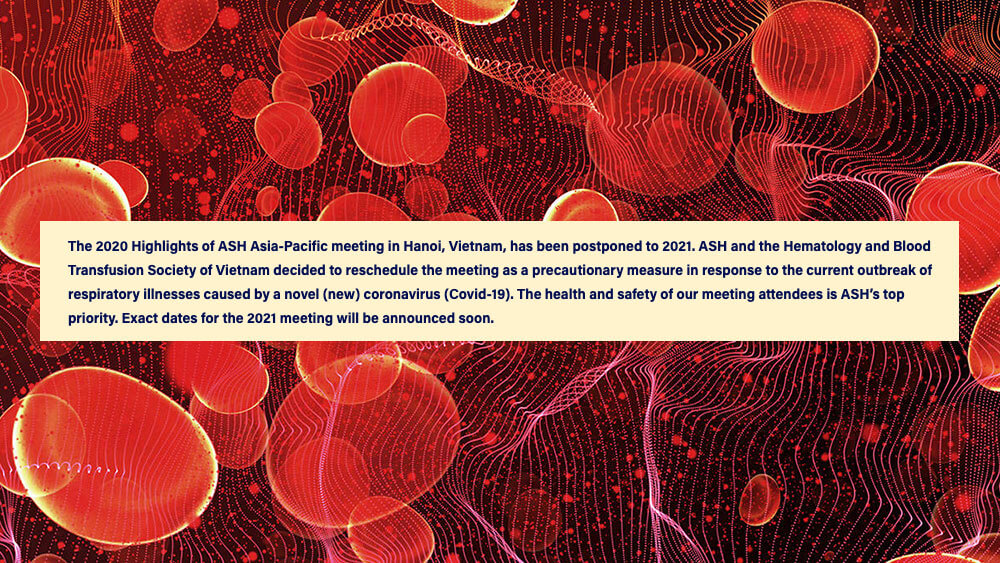
A message on the website for the American Society of Hematology’s Asia-Pacific meeting explains why the event has been postponed.
Takeaways from Bill Reed, chief event strategy officer at the American Society of Hematology
- The coronavirus crisis is a chance for all meeting professionals to flex their strategic thinking muscles.
- The longer you can delay a decision to cancel a meeting, the better off you are.
- Making the right decision relies on thinking about your individual circumstances and your stakeholders, not simply following in the footsteps of other organizations.
The spread of the novel coronavirus has forced many meeting professionals to confront big questions about managing crises, communicating with attendees, and assessing the risks of bringing thousands of people together. Bill Reed, FASAE, CMP, chief event strategy officer at the American Society of Hematology, is one of the business events leaders who had to pull the plug on a gathering. He called off the organization’s Asia-Pacific meeting in Vietnam, originally scheduled for March 13–14, as a precautionary measure and is currently evaluating whether to make changes to an upcoming event in Brazil scheduled for April.

Bill Reed, FASAE, CMP
These decisions are difficult, but Reed told Convene that the current COVID-19 crisis “presents a prime opportunity for anyone who wants to be seen as a business event strategist versus a meeting planner. If you are ready and want to flex your strategic muscles,” Reed said, “this is the time to demonstrate that you are ready for a C-level position.”
But pulling up a seat at the table means you need to have big shoulders and are ready to accept responsibility should a decision turn out to be wrong, Reed said. “Leadership is about accountability,” he said. “I hope that all leaders have some degree of fear about the decisions they’re making. This is important stuff. The stakes are high when you have people’s lives at hand. But this a time for people to be great thinkers. Evaluate all the scenarios but aim to address the most likely what-ifs. It’s important to stick to the facts and incorporate data as much as possible.”
There Is No One-Size-Fits-All Answer
Many meeting professionals are accustomed to following guidelines and cut-off dates for the work prior to a major event. However, Reed pointed out, there is no appropriate deadline for making the call on whether to cancel and event or move it to an online-only gathering in the face of this kind of uncertainty.
“I lament that our profession wants to prescribe a one-size-fits-all solution for every scenario. There is no silver bullet when thinking about a timeline” to make decisions during the COVID-19 outbreak, he said, “and it requires everyone to do what makes sense for their organization and their stakeholders.”
The longer you can delay the decision, the better off you are,” he added. “That goes against every norm that we use in business, but things are changing every single day. There are new facts and new variables. Instead of making a fast decision that you may regret later, I think it’s better to hold off until you absolutely have to decide.”
While new considerations are emerging, Reed pointed to the one constant that should act as a guiding principle. “Every decision should point to the safety of our stakeholder,” he said. “Some people are thinking about room nights and sales quotas, but the No. 1 priority here is health and safety.”
Your Network Has Never Been More Valuable
For event professionals who work for associations, Reed pointed out that the current situation is a good time to apply lessons from the corporate world. “They don’t have the luxury of [planning] events as far out as association professionals do,” he said. “They figure it out.”
While all meeting professionals will need to take ownership of decisions about cancellations or changes, Reed stressed that they can lean on the experience of their peers. “Our community often talks about the importance of networking,” he said. “Right now is the time to have to have your network in place. It’s not a social network, either. It’s a network that you can enlist to make great decisions.”
Reed has been in constant contact with a group of medical meeting professionals who execute some of the largest gatherings in the country. Participants have shared a-ha moments and other factors that impacted their meetings and their decisions throughout the past two months. While everyone is learning from each other, Reed said that those lessons cannot be copied. They must be adjusted to fit the needs of an organization and its stakeholders.
“Do not look for a template for a crisis plan or a communications strategy,” he said. “There isn’t one.”
David McMillin is an associate editor at Convene.
What Events Professionals Need to Know About COVID-19
PCMA has created a COVID-19 resources page to help event professionals find reliable information about the outbreak and to share events industry-related resources to ensure they are prepared.
